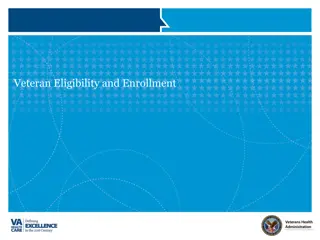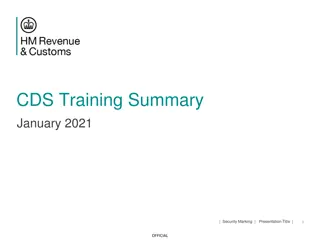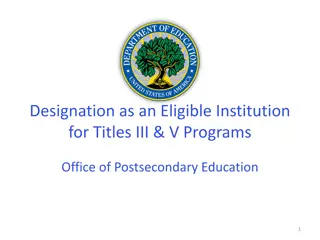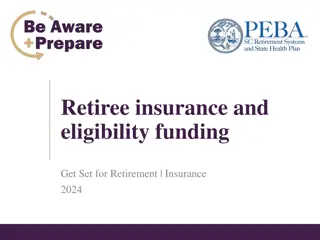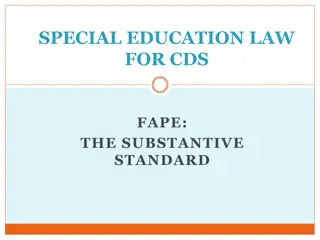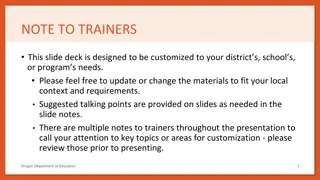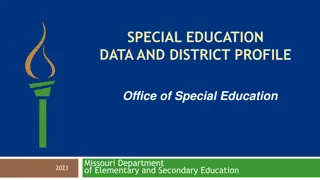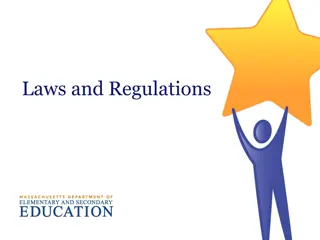Special Education Law and Evaluation Process for CDS Eligibility
Understanding special education law and the evaluation process for Children with Disabilities (CDS) is crucial for determining eligibility, developing Individualized Education Programs (IEPs), and monitoring progress. Key steps include IDEA requirements, obtaining informed consent, conducting evaluations, determining eligibility, and developing IEPs. Timelines, consent procedures, and the importance of assessing a child's disability and progress are highlighted to ensure appropriate educational support.
Download Presentation

Please find below an Image/Link to download the presentation.
The content on the website is provided AS IS for your information and personal use only. It may not be sold, licensed, or shared on other websites without obtaining consent from the author. Download presentation by click this link. If you encounter any issues during the download, it is possible that the publisher has removed the file from their server.
E N D
Presentation Transcript
SPECIAL EDUCATION LAW FOR CDS EVALUATION AND ELIGIBILITY
IDEA Requirements Locate Identify Evaluate Determine Eligibility Develop IEP Monitor progress Review/Revise IEP as appropriate Reevaluate as appropriate Transition out of special education
After Referral IEP Team receives a referral IEP Team determines if/what evaluations are needed to determine eligibility and programming IEP Team obtains informed consent from parent Evaluations conducted pursuant to the directives of the IEP Team IEP Team meets to determine eligibility If eligible, IEP Team develops IEP
Determination: Are Evaluations Needed? Must start by reviewing existing information about the child Provided by parent, including evaluations obtained through medical system Classroom based observations Formal/informal assessments Does not require a meeting; can be done based on discussions between IEP Team members Caution: claims based on failure to evaluate in all areas of suspected disability
Evaluations Needed Does the child have a disability? What is it? What are the child s present levels of performance? Are there accommodations/modifications that can be made to the regular education environment? Does the child need special education? Related services? - - - - - - - - - - - - Is the child making progress? Does the child continue to need special education and related services?
Timelines For CDS, per MUSER IV.2.E, the IEP Team must determine what (if any) additional evaluations are needed to determine if the child is a child with a disability and send a consent to evaluate form within 15 days of the receipt of the referral.
Consent LEA must obtain parental consent prior to evaluation Screening is not the same as evaluation IDEA 2004: LEA must attempt to obtain consent from parents (bio/adoptive) of children who are wards of the State If parent refuses to consent to an evaluation, LEA may, but is not required to, use due process to obtain authority to evaluate
Consent Means Parent has been fully informed in native language or mode of communication of all information about the action for which they are giving consent Parent understands and agrees in writing to that action and the consent describes the action and lists the records, if any, that will be released and to whom Parent understands that the consent is voluntary and can be withdrawn at any time Withdrawal of consent is not retroactive
Timelines Sending consent to evaluate form pauses timeline No timeline by which parent must return consent form
Timelines In Maine, CDS must conduct the initial evaluation and the IEP Team must determine whether the child is a child with a disability (i.e. eligible for special education) within 60 calendar days of receiving parental consent for the evaluation.
Evaluation Process Multidisciplinary Variety of tools and strategies Reflect aptitude and achievement in area being assessed, not impairment in other areas *Include an observation in the learning environment* No single procedure may be the sole criterion Decisions must be based on the data obtained through the evaluation process and made by a multidisciplinary team (IEP Team)
Nondiscrimination IDEA reflects concern over disproportionate representation/overrepresentation of minority children Requirement that tests be selected and administered in a non-discriminatory manner Must consider effect on test performance of student s cultural background
Reevaluation Reevaluation required of identified students every three years unless parent and CDS agree otherwise; more frequently if parent or CDS believe conditions warrant Not more frequently than once a year unless parent and CDS agree
Evaluation Reports Meet the requirements of MUSER V.4.C Shall not make eligibility or placement determinations Must be provided to parent at least 3 days before the IEP Team meeting at which the evaluation will be discussed
Meeting to Review Evaluation Data Draw on information from a variety of sources Include parent as a member of the Team Include as a member of the Team an individual who can interpret the instructional implications of the evaluation results No requirement that evaluator(s) be on the Team Determinations are made by the Team
IEP Team Parent At least one regular education teacher At least one special education teacher Representative of the CDS with authority to obligate CDS (funds) At the discretion of the parent or CDS, other individuals with knowledge or special expertise about the child An individual who can interpret the instructional implications of evaluation results For initial IEP Team mtg. Part C service coordinator
Attendance not necessary MUSER VI.2.E -- A member of the IEP Team is not required to attend an IEP Team meeting, in whole or in part, if the parent and CDS agree in writing that the attendance of the member is not necessary because the member s area of curriculum or related service is not being modified or discussed in the meeting.
Excusal MUSER VI.2.F -- A member of the IEP Team may be excused from attending an IEP Team meeting, in whole or in part, when the meeting involves a modification to or discussion of the member s area of curriculum or related service if Parent and CDS agree in writing, and Member submits, in writing to the parent and the IEP Team, input into the development of the IEP prior to the meeting.
Eligibility Be a child with a disability as defined in IDEA and MUSER: Autism, deaf-blindness, deafness, emotional disturbance, hearing impairment, intellectual disability, multiple disabilities, orthopedic impairment, other health impaired, speech language impairment, specific learning disability, traumatic brain injury, or visual impairment including blindness OR Developmental delay
Developmental Delay Developmental delay is a permissive eligibility category and defined entirely by the State State sets age range, anywhere from 3-9 In Maine, DD can be used from 3-5(K)
Developmental Delay 5 domains physical, cognitive, communication, social or emotional, adaptive 1.5 standard deviations below the mean in at least two domains or 2 standard deviations below the mean in one domain Must be based on more than one measure/ assessment Every effort will be made to identify a child s primary disability under one of the other Part B eligibility criteria, reserving developmental delay for those situations in which a clear determination cannot be made under any other category.
Eligibility Needs special education (MUSER VII.2) A child needs special education and related services when, because of the disability, the child can neither progress effectively in a regular education program nor receive reasonable benefit from such a program in spite of other services available to the child. The need is best established through evidence of a distinctly measurable and persistent gap in the child s educational or functional performance that cannot be addressed through services or accommodations available through the general education program.
Adverse Effect To adversely affect means to have a negative impact that is more than a minor or transient hinderance, evidenced by findings and observations based on data sources and objective assessments with replicable results. An adverse effect on educational performance does not include a developmentally appropriate characteristic of age/grade peers in the general population. (MUSER II.3) Must use State s required form.
Educational Performance Educational performance for a child age 3-5 means performance in age appropriate developmental activities across five domains of development (communication, physical, cognitive, self- help/adaptive, and social/emotional) in an education setting.
Eligibility For every eligibility category, MUSER has a procedure for determination Required forms
Substantive Requirements Full and individualized assessment Team decision making process using a group of knowledgeable persons including parent, professionals IEP Team Results of evaluations must be connected to (lead to) intervention where appropriate Areas of need identified through the evaluation must be addressed through the child s IEP present level of performance, goals, special education and related services . . .
IEEs Parent has the right to ask an LEA for an independent educational evaluation (IEE) at public expense if they disagree with an evaluation obtained by the LEA LEA must either pay for the IEE or demonstrate through a due process hearing that its evaluation is appropriate
#FAPEcats secret code FAPE113020


